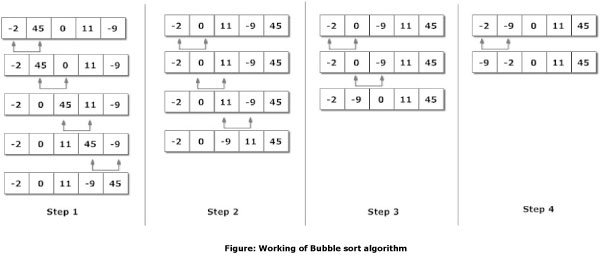The Bubble Sort
The bubble sort makes multiple passes through a list. It compares adjacent items and exchanges those that are out of order. Each pass through the list places the next largest value in its proper place. In essence, each item “bubbles” up to the location where it belongs.
Swap
temp = alist[i]#把I值赋给TEMP储存起来
alist[i] = alist[j]#把J的值赋给I
alist[j] = temp#在temp的值给Jdef bubbleSort(alist):
for passnum in range(len(alist)-1,0,-1):
#range([start], stop[, step])
#从后最后一个到第一个
#8,7,6,5,4,3,2,1
for i in range(passnum):#
print(alist[i])#打印8个,打印7个。。。以此类推
#一对一对往后比较,对换
if alist[i]>alist[i+1]:#当前一个数字比后一个数字大的时候 换位
temp=alist[i]
alist[i]=alist[i+1]
alist[i+1]=temp
#test
alist = [54,26,93,17,77,31,44,55,20]
bubbleSort(alist)
print(alist)
冒泡排序,2个循环嵌套
1,列表倒叙循环,找到元素个数
2,再从左到右循环,比较前后2个元素的值
时间
To analyze the bubble sort, we should note that regardless of how the items are arranged in the initial list, n−1 passes will be made to sort a list of size n. Table 1 shows the number of comparisons for each pass. The total number of comparisons is the sum of the first n−1 integers. Recall that the sum of the first n integers is 12n2+12n. The sum of the first n−1 integers is 12n2+12n−n, which is 12n2−12n. This is still O(n2) comparisons. In the best case, if the list is already ordered, no exchanges will be made. However, in the worst case, every comparison will cause an exchange. On average, we exchange half of the time.
Short bubble
A bubble sort can be modified to stop early if it finds that the list has become sorted. This means that for lists that require just a few passes, a bubble sort may have an advantage in that it will recognize the sorted list and stop. ActiveCode 2 shows this modification, which is often referred to as the short bubble.
def shortBubbleSort(alist):
exchange=True
passnum=len(alist)-1
while passnum>0 and exchange:#递归停止
for i in range(passnum):
if alist[i]>alist[i+1]:
#当知道不用换位的时候,passnum-1
exchange=True
temp=alist[i]
alist[i]=alist[i+1]
alist[i+1]=temp
print(alist)
passnum=passnum-1
alist=[20,30,40,90,50,60,70,80,100,110]
shortBubbleSort(alist)
print(alist)

Q-42: Suppose you have the following list of numbers to sort:
[19, 1, 9, 7, 3, 10, 13, 15, 8, 12] which list represents the partially sorted list after three complete passes of bubble sort?
[1, 3, 7, 9, 10, 8, 12, 13, 15, 19]
























 763
763

 被折叠的 条评论
为什么被折叠?
被折叠的 条评论
为什么被折叠?








